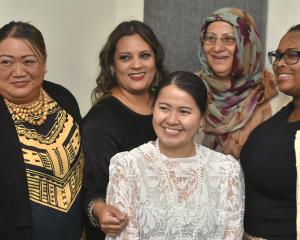
Nurses spent Thursday picketing hospitals protesting pay and conditions.
Despite discontent, nursing remains a profession which attracts hundreds annually, Ian Crabtree, head of Otago Polytechnic’s Nursing School, said.
"I think the ratio is three to four applicants for each student we take," Mr Crabtree said.
"We don’t have any problems filling our places and we usually have a wait list."
Despite not sugar-coating what nursing involves when talking to prospective students, few were put off.
"We tell them it’s not a Monday to Friday position; it’s working 24 hours a day, seven days a week, 365 days a year; and it requires a strong academic commitment ... but I think it’s a very rewarding career — I’ve been qualified for 35 years and if I had my time over again I’d do exactly the same," he said.
"Nurses are in a privileged position — they get to care for people at the most vulnerable times of their lives and have an impact on their health and wellbeing."
How do you become a nurse?
Each year, about 350 people apply for the three-year bachelor of nursing course at Otago Polytechnic — 125 are accepted.
Nursing courses are offered by 18 providers, including the Southern Institute of Technology in Invercargill.
Entry requirements at Otago Polytechnic include NCEA credits in biology or chemistry and English, and adequate literacy and numeracy skills.
Would-be nurses must also have a level 2 comprehensive first aid certificate, and two referees.
Those are important steps Mr Crabtree says — not everyone has what it takes to be a nurse, and it may not be the job people imagine.
"They need to understand what nurses do."
The bachelor of nursing course builds the foundation for a nursing career — aspiring nurses take classes in practice and theory, bioscience, pharmacology, psychology, pathophysiology and Maori health.
Half their time is spent in the classroom — 50% involves clinical practice.
Student workload is 40 hours a week, as well as assessments and assignments.
This comes at a cost: Otago Polytechnic’s indicative fees for domestic students are $7539 (first year), $7536 (second year) and $7826 (third year).
Graduate registered nurses are in demand though: 99% would have jobs within three months, Mr Crabtree said. Otago also offers an 18-month diploma of enrolled nursing — a level of nursing where graduates practise under a registered nurse, and which is often a stepping stone for those wanting to become registered nurses later.
Around 80% of those graduates would be working within weeks of finishing the course, he said.
What are nurses paid?
However the collective contract talks covering district health board nurses, midwives and other health-care staff are settled, pay will increase.
While these may not be the final figures, the DHB’s latest offer is that a graduate would begin on basic $49,449 — excluding weekend and night rates and any allowances — rising incrementally to a base salary of $54,034 in 2019.
Nurses working on weekends are paid at time and a-half of their normal rates.
Those on shifts from 10pm are paid at time and a-quarter.
By comparison, the median wage in New Zealand is $49,868, and a primary teacher’s base starting pay ranges from $36,692 to $59,621 depending on qualification.
A new police officer, including shifts and allowances, is paid about $62,791.
Registered nurses and midwives have a five-step pay-grade system — the new offer would introduce two additional steps, with "step 7" — a $77,386 salary — beginning in 2020.
Enrolled nurses earn less — a step 1 enrolled nurse would be paid $44,505 under the latest pay deal, but the proposal includes a new "step 4" in 2019, with a nurse at that level earning $57,047 a year.
The offer also covers health-care assistants and hospital aides, who perform many ward duties; their step 1 would begin at $36,955 in 2019 and they too would have an extra pay step in 2019 — "step 5" employees would earn $48,003.
Community mental health nurses, district nurses, public health nurses and community midwives have their own pay scale, from $49,449 at step 1 to $73,706 at step 8.
Designated senior nurses and midwives earn between $72,2980 and $114,967, depending on grading.
Is New Zealand losing nurses?
Anecdotally, plenty of nurses head overseas — one story circulating during the nurses’ strike told of an entire ward in a Melbourne hospital staffed by New Zealand nurses.
The Nursing Council — which handles registration of the country’s nurses — has been tracking workforce patterns since 2006.
Its most recent research, the Nursing Cohort Report 2016, found 52% of the 1323 New Zealand trained nurses who entered the profession in 2005-06 still practised here 10 years later.
Some were not in paid work, some had left nursing, some had taken up other health work and some had gone overseas — 18 of the 862 who met practice requirements.
Of the 2012-13 cohort of 1639 New Zealand-qualified nurses, 87% were still in the profession in 2016 — 28 of them overseas.
A significant number of nurses are from overseas — in 2012-13 1257 newly registered nurses in New Zealand qualified overseas.
Regardless of where nurses hail from, concerns about retaining them have been raised for years — a 2014 report by nurses’ organisations highlighted workforce development as an issue, and questioned whether the supply of overseas nurses could be relied on.
As the Otago Polytechnic experience shows, there is no shortage of people wanting to nurse — but as this week show, how to keep them happy remains to be addressed.












